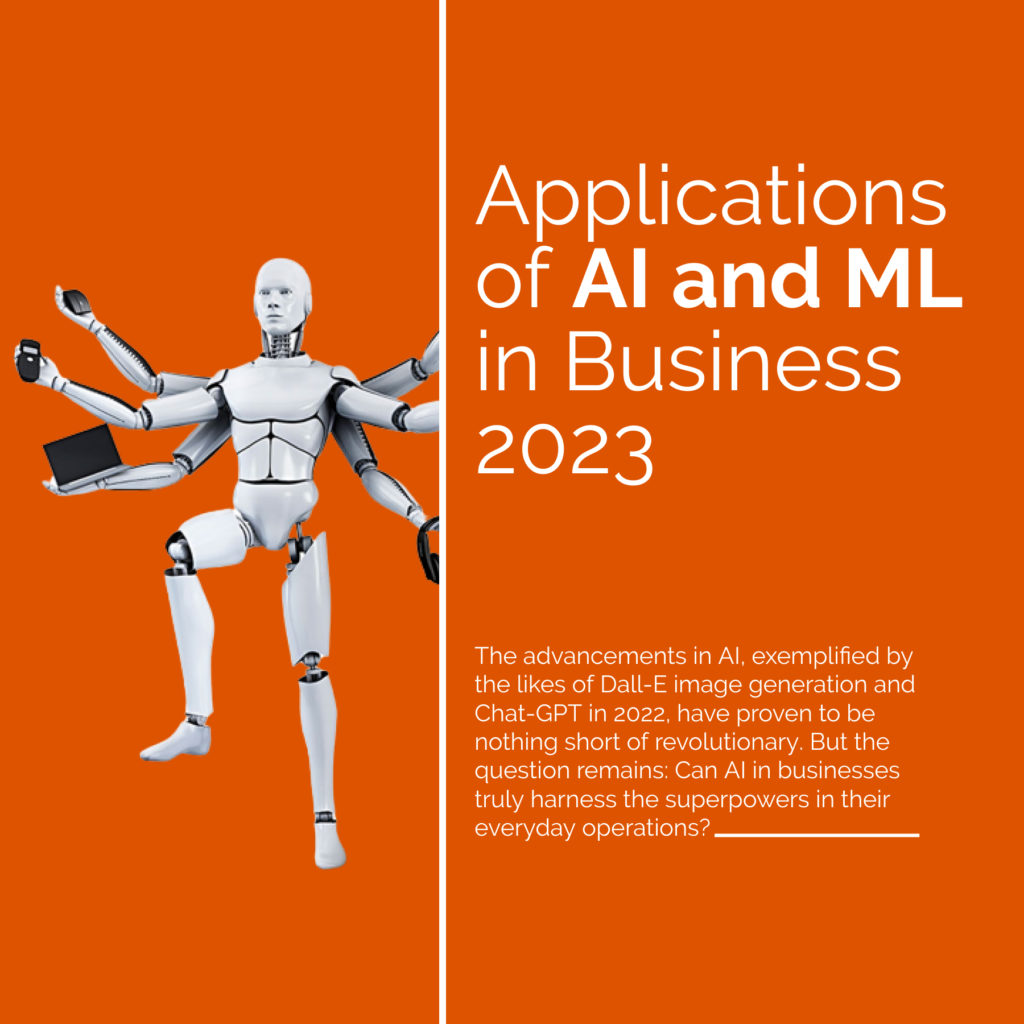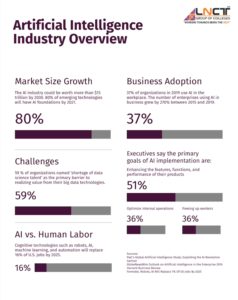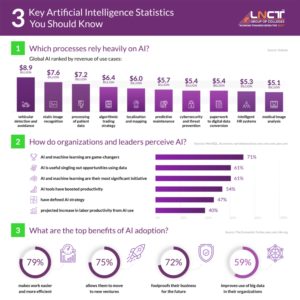The advancements in AI, exemplified by the likes of Dall-E image generation and Chat-GPT in 2022, have proven to be nothing short of revolutionary. But the question remains: Can AI in businesses truly harness the superpowers in their everyday operations?
The answer is a resounding yes!
AI has not only progressed technologically but has also become more accessible to non-technical users. Companies such as Levity are empowering business professionals by placing AI technology directly in their hands.
Why the application of AI in business is important
AI is not just making people more efficient; it is also transforming the way we conduct business. In fact, a remarkable 86% of CEOs acknowledge that AI has become an integral part of their offices. And this isn’t in the form of robots and complex machinery; rather, it comes in the form of software that seamlessly runs day-to-day operations. From predicting customer behavior to streamlining manual data entry, AI has become an indispensable tool in the business landscape, revolutionizing operations in unprecedented ways.
Artificial intelligence (AI) plays a supportive role in business rather than aiming to replace human intelligence and creativity. While AI may currently struggle with common sense tasks in the real world, it excels at processing and analyzing large volumes of data at a speed beyond human capability. By synthesizing potential courses of action, AI software can present them to human users, helping to streamline the decision-making process and assess possible consequences.
Amir Husain, the founder, and CEO of machine-learning company SparkCognition, describes AI as the next evolution of software. It is a form of software that can make autonomous decisions and act even in unforeseen situations, offering a broader range of decision-making abilities compared to traditional software.
These characteristics make AI highly valuable across various industries. Its applications range from facilitating efficient navigation for visitors and staff within a corporate campus to complex tasks like monitoring wind turbines to predict maintenance requirements. AI’s potential to enhance efficiency and perform intricate operations has made it a valuable asset in numerous business sectors.
INTRODUCTION
Artificial intelligence (AI) refers to human-like intelligence, basically computer software designed to replicate human cognitive abilities, enabling it to carry out intricate tasks that were previously exclusive to humans.
Machine learning (ML) is a specialized domain within the field of artificial intelligence that concentrates on training algorithms using data sets to generate models capable of carrying out intricate tasks.
Artificial Intelligence tasks encompass a wide range of capabilities, including decision-making, data analysis, and language translation. Through advanced algorithms and machine learning techniques, AI systems strive to emulate human intelligence and provide intelligent solutions to complex problems.
Machine learning tasks encompass a wide range of applications, including image classification, sales forecasting, and big data analysis. As of now, machine learning has emerged as the predominant method through which most individuals engage with AI, enabling the development of intelligent systems that can learn, adapt, and make informed decisions based on data.
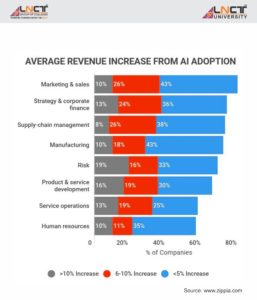
The Expansion of AI in Business
Average Revenue Increase from AI Adoption
The exponential growth of data in recent years has provided companies with unprecedented access to valuable information. As per Forbes, the volume of data generated and consumed has surged by 5000% between 2010 and 2020. This surge has paved the way for companies to leverage emerging technologies and harness user data for making well-informed business decisions.
In the recent past, numerous companies have wholeheartedly embraced AI as a means to unlock the full potential of their collected data. Consider the following indicators:
- The global AI market reached a significant worth of $62 billion in 2020 and is projected to experience an impressive annual growth rate of 40.2% from 2021 to 2028, according to Grand View Research.
- A survey by McKinsey titled “The state of AI in 2021” revealed that 56% of respondents reported adopting AI, showcasing an increase from 50% in 2020.
- Accenture’s report on AI highlighted that 84% of C-suite executives believe that harnessing AI capabilities will contribute to the attainment of their growth objectives.
These statistics vividly demonstrate that AI has transcended the realm of experimental technology and has become an integral component of operations for numerous companies worldwide.
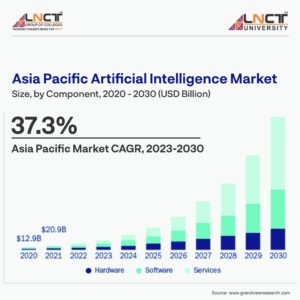
Common Uses of AI in Businesses:
Enhancing customer service: An example of AI-driven customer service is the use of chatbots. For instance, an e-commerce website may employ a chatbot that utilizes AI and natural language processing to provide instant assistance to customers. The chatbot can answer common queries, help customers navigate the website, and even recommend products based on their preferences.
Personalized product recommendations: Take the example of a streaming service like Netflix. By leveraging AI algorithms, Netflix analyses user viewing patterns, ratings, and preferences to suggest personalized content recommendations. This enables users to discover new movies and shows that align with their interests, enhancing their overall viewing experience.
Targeted marketing campaigns: An online retailer can utilize AI to segment its customer base and create targeted marketing campaigns. For instance, an apparel company may use AI algorithms to analyze customer data and send personalized emails featuring clothing items that align with individual preferences and past purchases. This approach increases the chances of conversion and customer satisfaction.
Analyzing customer sentiment: Social media platforms utilize AI-powered sentiment analysis to gauge public opinion about brands. For example, a company can employ AI algorithms to analyze tweets and Facebook posts mentioning their brand to gain insights into customer perceptions and sentiments. This analysis helps them understand how customers perceive their products or services and identify areas for improvement.
Fraud detection and prevention: Financial institutions often employ AI-based fraud detection systems. For instance, a credit card company can use machine learning algorithms to monitor transactions in real time, flagging suspicious activities such as unusual spending patterns or potential identity theft. This helps prevent fraudulent transactions and protect customers from financial losses.
Optimizing supply chain operations: An example of AI optimization in the supply chain is the use of predictive analytics. For instance, a retail company may employ AI algorithms to analyze historical sales data, market trends, and external factors to forecast demand accurately. This helps them optimize inventory management, minimize stockouts, and ensure efficient product distribution.
Here are ten prime examples showcasing how companies effectively employ artificial intelligence in practical applications.
Alphabet – Google
Alphabet, the parent company of Google, has ventured into the realm of artificial intelligence with notable initiatives. Waymo, a division focused on self-driving technology, originated as a project within Google. Waymo aims to not only provide autonomous transportation but also reduce accidents. Currently, Waymo’s self-driving taxis operate in California, although they are accompanied by human drivers and cannot charge fares during the pilot program. Google displayed its commitment to deep learning through the acquisition of DeepMind, which achieved significant milestones like mastering various Atari games and defeating professional players in the game of Go. Additionally, Google Duplex, an AI voice interface, employs natural language processing to make phone calls and schedule appointments on behalf of users.
Amazon
Amazon, a prominent player in the artificial intelligence landscape, incorporates AI into multiple facets of its business. Apart from its digital voice assistant, Alexa, Amazon leverages AI to optimize various operations. Notably, Amazon employs predictive analytics to anticipate customer needs based on their buying habits, enabling them to ship products before customers even consider making a purchase. Furthermore, Amazon’s innovative convenience store concept, Amazon Go, utilizes AI technology. These stores employ AI systems to track items customers pick up, eliminating the need for checkouts. Cameras monitor customers’ activities, accurately identifying items they place in their bags and automatically charging them via the Amazon Go app.
Apple
Apple, known for its consumer electronics and software services, integrates artificial intelligence and machine learning into its products. Noteworthy implementations include the FaceID feature on iPhones, which utilizes AI for facial recognition. Products such as AirPods, Apple Watch, and HomePod smart speakers incorporate AI to power the Siri virtual assistant. Additionally, Apple employs AI to enhance its service offerings, recommending songs on Apple Music, organizing photos in iCloud, and providing navigation assistance through Maps.
Baidu
Baidu, often referred to as the Chinese equivalent of Google, extensively employs artificial intelligence. Notably, their Deep Voice tool utilizes AI in business and deep learning to clone voices with just 3.7 seconds of audio. Baidu also utilizes this technology to develop a tool that can narrate books in the author’s voice, automating the process without the need for a recording studio.
Facebook utilizes AI in business and deep learning to derive structure from its vast amount of unstructured data. Their text understanding engine, DeepText, automatically interprets the content and emotional sentiment of the numerous user posts published every second, across multiple languages. With DeepFace, Facebook achieves remarkable facial recognition capabilities, surpassing human performance in identifying individuals in photos shared on the platform. Additionally, Facebook employs AI to automatically detect and remove images of revenge porn that are posted on its site, exemplifying its commitment to tackling harmful content.

